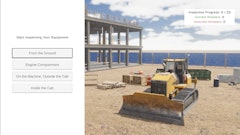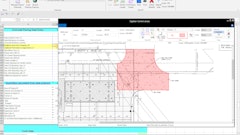The Haskell Company is one of the most preeminent design-build firms in the nation, providing complete planning, architectural, engineering, construction, program management, real estate, financing and facility management services on a single-responsibility basis. Founded in 1965 and headquartered in Jacksonville, FL, the company currently has 1,250 employees and a 70 percent repeat client base. Haskell's expertise spans industrial, commercial, institutional, public and civil infrastructure projects. In addition to receiving many general corporate and individual awards, Haskell has received over 120 local, state and national project awards from various industry organizations.
With $700M in annual sales and 1,250 employees working on projects throughout the Western Hemisphere, the Haskell Company has come to rely on ProjectTalk by Meridian Systems to provide standardized workflow and on-demand project collaboration.
ProjectTalk is a project management hub that provides architectural, engineering and construction firms with access to Meridian's Prolog software functionality via the Internet as a subscription service. ProjectTalk is a high-tech, low overhead solution for companies that want Prolog's robust project management features but don't want to deal with the IT costs and resources needed to deploy and manage the software internally.
Although Haskell originally purchased Meridian's Prolog Manager software 10 years ago, when ProjectTalk became available, the company took advantage of the opportunity to switch to the application service provider (ASP) delivery model.
"Moving toward ASP providers, especially for specialized software like Prolog, is a business model that allows Haskell to reduce its costs for capital investments and IT staff," explains Susan McDowell, Haskell's Construction Technology Application Manager and ProjectTalk administrator. "ProjectTalk works great for us because we don't have to invest in software licenses and servers and we don't have to watch our user count too closely since we pay by subscription fee."
The highly-scalable nature of ProjectTalk was a significant benefit to Haskell when it decided to expand its use of the software to include its safety and quality assurance (QA) groups. Haskell's goal was to gather data in ProjectTalk to further improve its award-winning safety program and strengthen its commitment to quality. With 300 current ProjectTalk users (150 of them using the software every day), Haskell was confident that adding this additional group of users to its system would be seamless
Customized Technology
Although using ProjectTalk had become second nature for Haskell's core project team, McDowell felt that use of this technology by new, intermittent users like the safety and QA staff wouldn't be as intuitive. So she set out to learn as much about their needs as she could. "When reaching beyond your core user groups," she says, "it's important to evaluate their processes so you can develop tools to assist them. You need a first-hand understanding of each person's motivation so that the software interface can be customized to their needs."
Once there was a clear understanding of how ProjectTalk would benefit these new users, Haskell began customizing the program accordingly. "We streamlined the safety and QA data entry screens by customizing the nomenclature to speak their language, preloading drop down lists with standard values and turning off the features that these groups didn't need," McDowell says. "With customized screens and forms, we've made it as easy as possible for the safety and QA staff to simply log in and enter their information."
A Diverse Training Portfolio
Haskell's well-developed ProjectTalk training programs were of significant benefit when introducing the technology to these new software users. The company's training portfolio includes:
- A 12-seat hands-on computer lab
- Informal one-on-one sessions
- Task-specific telephone training
- Five to eight minute video tutorials
- Step-by-step how-to documents with screenshots and flow charts
- Periodic newsletters that discuss recurrent issues and Help desk requests
- Project start-up training that involves a sit-down with the project team to discuss processes, responsibilities and how ProjectTalk will facilitate workflow
"For the safety and QA staff, we ended up doing a lot of one-on-one training to walk them through a real inspection," she says. "Someone would come in from the field and have 10 items to write up for a job site and we would sit down and go through the actual data entry."
Meeting Safety and QA Goals
Although McDowell does say that training these non-core groups on ProjectTalk is a work-in-progress, she feels that Haskell has recently made great strides toward meeting individual and corporate safety and QA goals.
On the individual side, the company has worked hard to ensure that ProjectTalk is making jobs easier for its safety staff and QA personnel. For example, one challenge faced by these users is lack of Internet access while traveling from job site to job site. To overcome this challenge, says McDowell, "We developed specialized Excel spreadsheets that allow data to be entered offline and imported into Prolog by an administrative assistant at a later date."
As a result, ProjectTalk has become a mobile toolset for completing items such as quality inspection forms and documenting safety-related details such as notices, inspections, violations and meeting minutes.
On the corporate side, the company now has useful metrics to measure trends across projects and groups. "With ProjectTalk," states McDowell, "we are able to identify what safety and quality issues we may be having, which job sites would benefit from further training, and what divisions have higher risk as a result of violations. This allows us to take concrete steps to mitigate the problems and improve safety."
Standardized safety codes in ProjectTalk allow Haskell to evaluate inspection items across all projects to see what type of safety violations are occurring. "While our gut feeling might be that problems are with a particular area, such as trenching or scaffolding, real numbers in ProjectTalk will either confirm that or point in another direction," says McDowell.
As part of a self-insured workers' compensation consortium, being able to document its safety program in such great detail certainly works in Haskell's favor. "Using our ProjectTalk data to demonstrate our diligence around managing risk and keeping safety incidents down definitely keeps our insurance rates low," says McDowell.
Similar trend evaluation has helped identify - and reduce - repetitive quality issues. Quality patterns can be identified and backed up by hard numbers that confirm, for instance, that 30 percent of inspection items for the last month had to do with roofing. Job superintendents can then spend extra time around these issues to lessen recurrence.
"ProjectTalk helps Haskell deliver a superior product through better management of quality issues," states McDowell. "Instead of repeating the mistakes made on previous projects, this data helps us understand how to prevent them and what areas need extra vigilance to meet our high standards for quality."
Building Best Practices
Because Haskell's ProjectTalk project management procedures are closely intertwined with its companywide best practices, adding the safety and QA component has been a natural step in this leading design-builder's management evolution.
| The Haskell Company Project Profile The Quaker/Tropicana/Gatorade (QTG) Blue Ridge bottling facility located in Wytheville, VA In late 2002, QTG (Quaker/Tropicana/Gatorade) engaged Haskell in a multiple site search for a new Gatorade manufacturing facility. In 2005, Haskell broke ground on the new facility located in Wytheville, VA. Throughout the project, Haskell utilized its Designing for Safety Program, a program dedicated to preventing injury and loss of life. By designing safety into its buildings both during and after construction, the company set new standards in safety. Haskell's in-house Quality Assurance group also maintained a key role throughout the project. With experts in the geo-technical arena, as well as in concrete, steel, roofing and other building systems, they provided support for geo-technical evaluation, integrated design reviews, preconstruction conferences and field testing programs. Haskell's unique approach to project integration, value engineering and collaboration, from inception to equipment installation, had a tremendously positive impact on the project's success. The in-house team was able to quickly evaluate cost, constructability and schedule impacts and make necessary adjustments to ensure the customer's satisfaction. Key Project Elements
Project completion date: November 8, 2006 Awards Results The project was originally scheduled for completion on October 12, 2006, but with the bottle receiving addition, this date was extended and the final project completion occurred on November 8, 2006, two weeks ahead of schedule. QTG has now contracted Haskell to construct additional facilities of this nature in other parts of the country. |


























